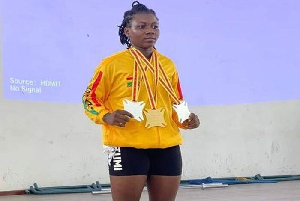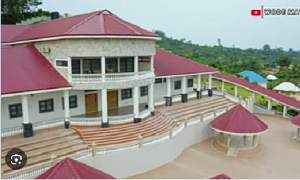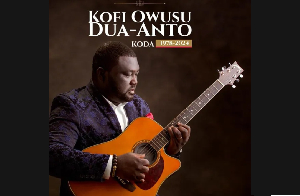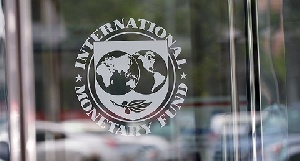- Home - News
- TWI News | TV
- Polls
- Year In Review
- News Archive
- Crime & Punishment
- Politics
- Regional
- Editorial
- Health
- Ghanaians Abroad
- Tabloid
- Africa
- Religion
- Election 2020
- Coronavirus
- News Videos | TV
- Photo Archives
- News Headlines
- Press Release
Opinions of Wednesday, 29 February 2012
Columnist: Asubonteng, Bernard
Some Cultural Practices are Self-destructive
by Bernard Asubonteng
In fact we can sit here perhaps till eternal trying to figure out an emphatic definition of culture or what actually constitutes culture, but the results of such an attempt would be an elusive marathon, to say the least. In other words, opinions and interpretations widely vary in an effort to understand the precise definition of the past or the contemporary cultures. One of the major reasons for this lack of unanimity of opinion is that almost all societies have historical as well as conceptual underpinnings of culture that are not only complex in their urban familiarity, but also they tend to be subtle.
So, how then do we define culture, at least, for the purpose of this current conversation? Some of the non-exhaustive definitions of culture that many experts have put forward emphasize culture simply “as a way of life.” This way of life involves the food we eat, the type of clothes we wear, how we mourn death or celebrate birth, our spiritual beliefs and worship, our political systems including international relations, and the kind of sports or entertainment we enjoy passionately, and so on.
In his part, an American scholar, Fred Jandt, for example, shares the view that culture is an aggregate of a group of people’s line of thinking, experiences, behavioral patterns and their underlying concepts, values, and assumptions about life that shepherd “behavior and how those evolve with contact with other cultures.” We must point out, though, that irrespective of the vast differences in the interpretations or definitions of culture, almost all experts agree that culture has no genetic component. Culture and its various components are learned process and environmentally centered.
For Geert Hofstede, an influential Dutch anthropologist and social psychologist, culture has four main components that include symbols, rituals, values, and heroes. Time and space may not allow us to go into details about each of these four cultural dimensions. However, in the context of our present discussion we will briefly look at rituals, values, and heroes, including the extent to which they exert pressure on the worldviews or behaviors of a given community or a group of people. Essentially, rituals are collective social activities anchored in a culture. No doubt, like the other preceding cultural elements, rituals play pivotal role in influencing the mindset of the members of a population who identify themselves with a set of culture.
Values, on the other hand, are viewed as “less-talked-about” feelings embedded within almost all cultures that help the members to determine that which is beautiful or ugly, right or wrong, normal or abnormal, and the like. In many cultures, too, heroes find expression in the past, present, real, or imaginary people whose services or actions are not only regarded as lofty models within a culture but also exemplary feats that need to be replicated if possible. Examples of heroes can be our sports men and women, national leaders, musicians, and others who have accomplished a lot in life and those who occupy positions of responsibility. Every culture, it appears, has heroes or stories about them. I may revisit this hero issue later on.
Certainly, what we are trying to emphasize here is that for better or for worse, culture is one of the important drivers if not the most essential building block of human progress. Needless to say, culture’s fingerprints are all over many of our thought processes, which mean that some of the African cultural practices are militating against the continent’s fast-paced development in this globalized world.
We usually talk about strong work ethics, educational system, perseverance, patriotism, political culture, and culture of maintenance, environmental worldview, family values, and many more. A great deal of them is influenced by our cultural habits and peculiar experiences as opposed to genetic trait. This is not to say that genetics may not play some role here. Indications are that after we are born our environment takes over.
In the book “Intelligence and How to Get It,” Richard Nisbett, a Distinguished American psychologist, argues against the age-old belief that intelligence is deeply encoded in our genes. He points to many contemporary studies relating to genetics, psychology, neuroscience, including the latest researches that reinforce the notion that timely and effective educational support systems have shown that schools and cultures strongly count (probably) more than the so-called genes. These studies undermine the century-old myth that somehow one group of people is superior to other group, hence that group’s high-level development or advancement pace.
Undoubtedly, African countries are far behind almost all the Western nations in terms of development not necessarily because the latter states have superior intelligence people. The cold truth is that most of these Western states, and even lately many Asian countries, are far advanced because they have developed powerful environmental conditions through schools, including positive cultural habits that help to harness their people intelligence potential to innovate and progress. Genes or hereditary factors have insignificant roles in this context.
This brings us to this pervasive development in many parts of Africa. For example, you work hard, save money to build your dream house as happen in many African societies. Around many of these beautiful houses or mansions are huge potholes, dumping of trashes and dusty roads that necessitate a scenario in which the house owners are forced to spend huge sums of money to repair or repaint these houses almost every six months or so. Thus in many African societies, people are good at investing in houses and other properties but woefully lack the culture of maintaining these assets.
In fact there seems to be an entrenched culture in many African societies that instead of pooling resources together to keep their surroundings clean and the streets tarred with asphalt, many of these landlords sit down and expect the corrupt and resources-depleted central governments to come give these areas facelift. These expectations from governments, in most cases, never materialized.
It is a sad spectacle but this is one of the many instances of self-destructive culture hindering fast development and blinding most of us to some of the obvious facts of contemporary realities. Ironically many are in denial; and, in the process, they failed to take responsibility for clinging dogmatically to some of these backward cultural rituals while busy laying blame on other people or some distant countries.
Honestly, I was not so surprised to read a Ghana News Agency report on February 23, which the Ghana national soccer team’s coach in his assessment of Ghana’s poor performance at the just-ended 2012 Africa Cup of Nations attributed the alleged use of witchcraft by some players. We may have no way to confirm or deny these “juju claims” by the Ghana soccer coach. However, the fact that a great soccer nation such as Ghana has many of its players allegedly embracing these primitive practices in modern sports speaks a lot regarding Ghana’s soccer progress and African football in general lack of focus, consistency, and effective planning.
If the so-called black power is effective or real, at least one of the African nations would have won the FIFA World Cup many times over by now. The World Cup event was hosted in Africa soil in 2010 but none of the countries in the continent even reached the semi-final stage. Folks, let get real; for studies after studies show that success or progress in every human endeavor depends on the culture of proper planning and practice, culture of self-discipline, culture of accountability, culture of perseverance, culture of teamwork, and of course, education. “Juju” mentality is one of the self-destructive practices in the 21st century socio-cultural narrative.
The writer is based in Atlanta, Georgia. He has a master’s degree in international relations (US national security affairs) and can be reached at: b.asubonteng@gmail.com
I










